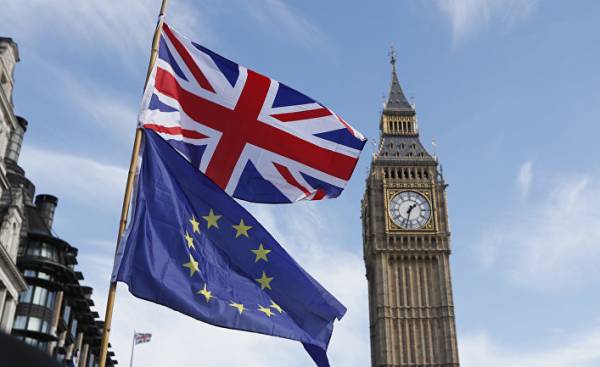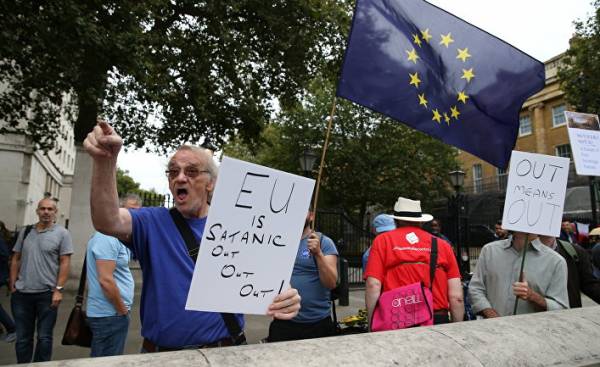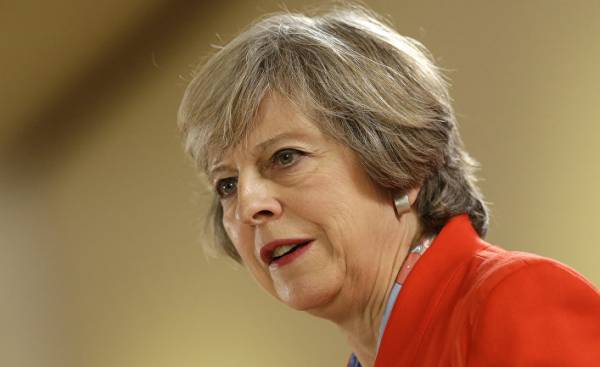
London — the Economic reality begins to destroy the false hopes of many Britons. A year ago, when with a slight advantage Britain voted to exit the European Union, they believed the promises of the tabloid press and politicians involved in the campaign for withdrawal from the EU, if Pexit does not degrade the standards of their lives. Indeed, in the past year they were able to preserve these standards due to the buildup of debt by households.
Some time it all worked, because the increase in the consumption of households stimulated the growth of the economy. But the moment of truth for the British economy is fast approaching. As shown by recent figures published by the Bank of England, the pace of wage growth in Britain had ceased to keep up with inflation, and hence real incomes began to fall.
In the coming months, this trend will continue, and households will soon feel that their living standards are falling. They will have to adjust their consumption habits. But even worse, they will understand that they are overloaded with debts and take their repayment, thus even more reducing the volume of personal consumption supported the growth of the economy.
The Bank of England made the same mistake that the average household: he underestimated the effect of inflation. Now it will catch up with her, procycling increasing interest rates. This rate hike will further impede the payment of debt of households.
The British are rapidly approaching the critical point, which is characteristic of all the unstable economic trends. I call these moments of “reflexivity”: cause and effect mutually shape each other.
The economic reality is reinforced by political reality. Breaksit is a losing idea for everyone, it is harmful and Britain, and the European Union. And that’s a fact. But although the referendum on Breccia cannot be undone, people can change their minds.
Apparently, this is what happens. The attempt of Prime Minister Theresa may to strengthen its negotiating position with the EU due to the early elections ended is very sad: she lost the parliamentary majority and created a “hung” Parliament in which no single party has a majority.
 © AFP 2016, Justin TallisСторонники exit from the European Union during a demonstration in London, UK
© AFP 2016, Justin TallisСторонники exit from the European Union during a demonstration in London, UK
The main reason for the defeat of may — her fatally flawed proposal to require seniors to pay a significant portion of the costs to provide them with social assistance from its own funds. Usually, we are talking about the value of the house in which they lived all his life. This “crazy tax” as many call him, deeply offended a key voter of the Conservative party, may is the elderly. Many of them either did not go to the polls or supported other parties.
An important factor that contributed to the defeat Mei, also became more active participation of young people. Many young people voted for the labour party in protest, not because I want to join a Union or support of the leader of labour’s Jeremy Corbin (Jeremy Corbyn), although he suddenly had a very impressive campaign.
The position of the British youth in relation to the European common market diametrically opposed positions Mae and supporters of the “hard” Breccia. The youth seeks to find well-paid jobs, which can either be in Britain or any other country in Europe. In this sense their interests coincide with the interests of the city of London, where to find such jobs.
If Mei wants to retain power, it will have to change the approach to negotiations about Breccia. And there are signs that she is ready for this.
Approaching the negotiations, which will begin June 19, in a conciliatory spirit, may be able to reach an understanding with the EU about the further plan of action and to negotiate continued membership in the common market for the period, which will be sufficient to complete all the necessary legal work. This would be a great relief for the EU, because the arrival of the unfortunate day when Britain will create a huge hole in the EU budget, will be postponed. This will be a mutually beneficial arrangement.
 © AP Photo, Alastair GrantПремьер Minister Theresa may
© AP Photo, Alastair GrantПремьер Minister Theresa may
Only by this way, may be able to count on the support of Parliament all the laws that need to be taken as soon as negotiations on Brexia will end and Britain will leave the EU. Perhaps she would have to abandon the poorly thought-out Alliance with the Democratic unionist party in Ulster, but instead more determined to unite with the Scottish tories, who are in favor of a soft version of Breccia. May also have to make up for the sins of the conservatives before the London Kensington district, where last week in a fire at a residential tower Grenfell Tower has killed at least 30 people and maybe much more.
If may stand on a platform, it manages to stay at the head of the government parliamentary minority, because nobody wants to take her place. To complete Brexia need at least another five years, during which time new elections will be held. If all goes well, the two sides of the negotiation process will again want to get married, even before to finish process of divorce.







